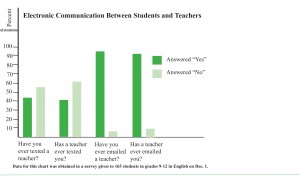
A new policy causing concern among many staff and students will be up for discussion on the school board agenda Dec. 12. The rule intended for a new staff handbook states, “Mount Vernon Community School District recommends that employees not release their cell phone number, personal email address, etc. to students or their parents.” High School Principal Steve Brand said the reason for this rule is to protect teachers and their relationships with students. “Anytime you email or text there is no tone, body language, or other indicators of how that message is being said,” Mr. Brand said.
Social Studies teacher Maggie Willems, also the head volleyball and track coach, said she texts and/or emails students every day. “I often text or email, primarily athletes, to communicate reminders and follow-up after practice,” said Mrs. Willems. She said that the rule would lead to a lot of missed opportunities to help students, especially when a student is seeking help, personal or academic.
Since 2009, when the district provided students with an email address through the school, the communication through email has become almost necessary. This resource has grown, not only to communicate, but also to share electronic documents and assignments. In a survey of 165 students in grades 9-12 conducted Dec. 1 by The Mustang Moon, 157 out of 165 students said that they have emailed a teacher. Junior Colin Smith said that he uses email to get assignments for his Introduction to Engineering class. Other students surveyed said that they email teachers when they are absent to find out what they have missed and keep up with the class. The communication goes both ways. One hundred fifty one out of 165 students said that a teacher has emailed them.
English teacher Tawnua Tenley understands “to a degree” that the rule is to maintain appropriate communication but she said, “There doesn’t need to be a rule; common sense should dictate a policy.”
The district rule also, “strongly encourages the employee, coach or sponsor to include the principal and/or parent on messages.” Mrs. Tenley, whose son is a senior, said, “As a parent I don’t want a copy of an email unless there is a problem. Parents may get bombarded with miscellaneous emails about student’s assignments and disregard them, missing something important.”
Under the rule, mass texts to athletes are acceptable but parent permission is still suggested. The main reason teachers will text students is that students check their text messages a lot more than their email, and to communicate with them in a timely manner, texting is much more efficient.
Science teacher Charlie Gardner texts students up to three times a week, for activities unrelated to school like hunting, fishing and playing racquetball. This new rule would, he said, “cause me to plan during the school day.”
Other teachers also have students’ cell phone numbers to babysit or watch pets but Mr. Brand said that these communications would still be allowed because they are something parents are aware of.
Only 3 percent of students said they had never texted or emailed a teacher. Forty-seven percent of students said they had texted a teacher or a teacher had texted them. The most common reason was sport-related texts for practices and reminders, but other students said that they text teachers for babysitting, getting assignments, or personal reasons. Sophomore Cassidy Steines said, “I text Mrs. Gage about camera issues for yearbook. If I couldn’t do this the yearbook photos would be awful.”
As technology becomes more prevalent in society and more advances are made, it will continue to affect communication and education. Mrs. Willems said, “I feel strongly that it is evolution in society that we are going to use all media in education and is appropriate when used in an ethical manner.”
Mrs. Tenley believes that teachers can help students learn how to communicate effectively and responsibly. “If students are behaving like adults, I will treat them accordingly. Students need to learn how to communicate and be proactive in their lives,” Mrs. Tenley said.
Ethical use is the concern behind the rule. Is texting or emailing always being used in an ethical manner for educational purposes? Mr. Brand said, “Ultimately we are just trying to take necessary precautions to protect our staff members and their relationships with students.”
And while this is understood by the teachers Mrs. Tenley said, “If the district wishes to encourage responsible communication that should be enough. Unfortunately no policy is going to stop teachers from acting unprofessionally if they choose.”
Junior, Seamus Taylor doesn’t believe that this rule is necessary for the district. Seamus said, “There is no reason to inhibit positive communication between students and teachers.”
This rule isn’t final by any means. There is a group working today on the handbook that is made up of 12 district teachers, Mrs. Bush, the elementary and middle school principal, and Mr. Brand. They are working to create a draft that everyone will be able to accept. Since this will put into place as a district policy, the school board will need to approve the handbook. Mr. Brand said he doesn’t know if it will ever pass, but district employees are working together to create a guide that will reflect the values of the Mount Vernon Community School District.











